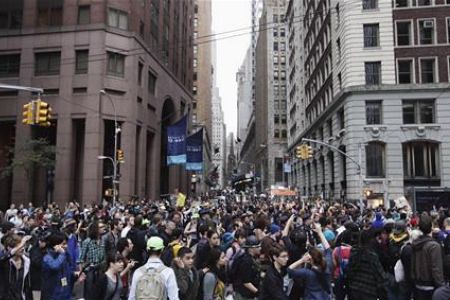
Thousands came out in defense of the Occupy Wall Street demonstrators who have been staging a sit-in at Zuccotti Park in Lower Manhattan. The City of New York backed off removing the people occupying the park since Septemmber 17., a photo by Pan-African News Wire File Photos on Flickr.
latimes.com/business/la-fi-us-markets-20111101,0,5065689.story
latimes.com
Stocks slide on worries over European debt, MF Global bankruptcy
The Dow Jones industrial average suffers its biggest one-day drop in four weeks, putting a damper on October's strong gains, as rising Italian government bond yields and the failure of another brokerage unnerve investors.
By Tom Petruno, Los Angeles Times
November 1, 2011
The stock market is beginning what is often its best two-month period of the year. But the bulls lost control on the last day of October.
Equities tumbled worldwide on Halloween, denting the month's powerful advance, as worries about Europe's debt crisis flared again and the bankruptcy of brokerage MF Global Holdings Inc. rattled Wall Street.
The dollar jumped as some investors sought the usual havens, and as Japan intervened in currency markets to try to beat back the yen from all-time highs.
The Dow Jones industrial average slumped 276.10 points, or 2.3%, to close at 11,955.01, the largest one-day drop in four weeks.
For October overall the blue-chip index rose 1,042 points, or 9.5%, as recession worries faded. It was the biggest monthly gain since October 2002.
The Standard & Poor's 500 index fell 31.79 points, or 2.5%, to 1,253.30 for the day. The S&P jumped 10.8% for the month, its best gain in nearly two decades.
Trading volume was relatively moderate Monday, suggesting there was no mad rush for the exits, though selling accelerated near the closing bell.
Many analysts had warned at the end of last week that the market was overdue for a pullback after soaring for most of October. In Wall Street parlance, stocks were "overbought."
Headlines on Monday brought good excuses for jittery traders to sell: Italian government bond yields rose, raising fresh doubts about Europe's latest plan to solve its debt crisis.
When European leaders Thursday announced their new strategy to end the debt nightmare, one goal of the plan was to make investors feel confident about buying Italian bonds, thereby driving interest rates down. Instead, yields are rising.
The yield on Italy's 10-year government bond rose to 6.09% on Monday, the highest level since early August and up from 6.02% on Friday. The yield on two-year Italian bonds surged to 4.99%, up from 4.75% on Friday and the highest rate since 2008.
If global investors begin to think that Italy can't repay its debts, the crisis could become a cataclysm. Italy is the world's third-largest bond market, after the U.S. and Japan.
A key element of the plan is the expansion of Europe's $600-billion rescue fund for member states and banks. The fund is expected to eventually guarantee bonds issued by deeply indebted countries, particularly Italy.
But the continuing rise in Italian bond yields shows that many investors and traders doubt the plan will work — or they believe the Europeans will drag their feet implementing it.
Most European stock markets slid between 2.8% and 3.8% on Monday, after rocketing in the aftermath of the rescue-plan announcement.
In the U.S., MF Global's failure, though not a total surprise, spooked investors by resurrecting memories of the collapse of Lehman Bros. at the height of the financial crisis in September 2008.
Some investors and traders rushed into the classic hideouts: U.S. Treasury bonds and the dollar. The yield on the 10-year T-note dived to 2.11% from 2.32% on Friday. The dollar rallied against most currencies, helped by Japan's decision to begin selling yen and buying dollars.
The yen had hit a record high against the greenback Friday, posing an ever-rising threat to Japan's economy by boosting the cost of its exports. That pushed the Japanese government into action Monday.
The move had the desired effect. The dollar jumped 3.1%, to 78.18 yen from 75.82 on Friday, although the U.S. currency still is down against the yen year to date.
On Wall Street, bulls know they have history on their side in the near term — assuming that the U.S. economy keeps growing, Europe doesn't implode and no other major disaster looms. Since 1950, November and December have been the stock market's best two-month period of the year, on average, as investors often look ahead to the new year with optimism.
The market faces two important events this week: Federal Reserve policymakers meet Wednesday and are expected to reiterate that they are prepared to offer the economy more help if necessary.
On Friday, the government reports on October employment. Economists expect that the U.S. added 95,000 net new jobs last month, about the same as September.
tom.petruno@latimes.com
No comments:
Post a Comment